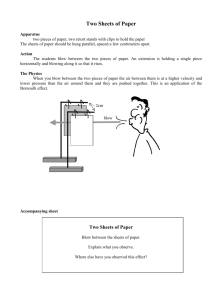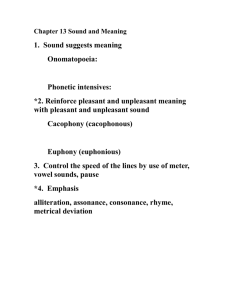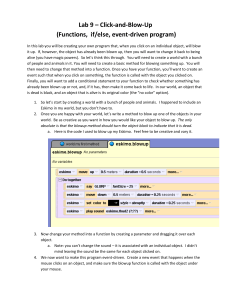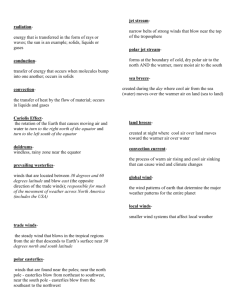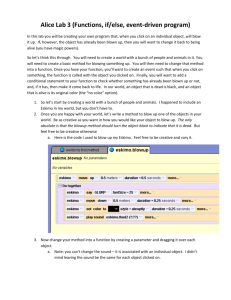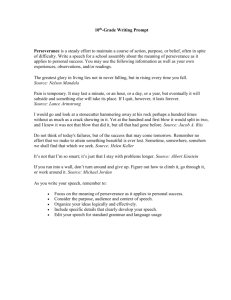An Accentual Poem Sampler
advertisement
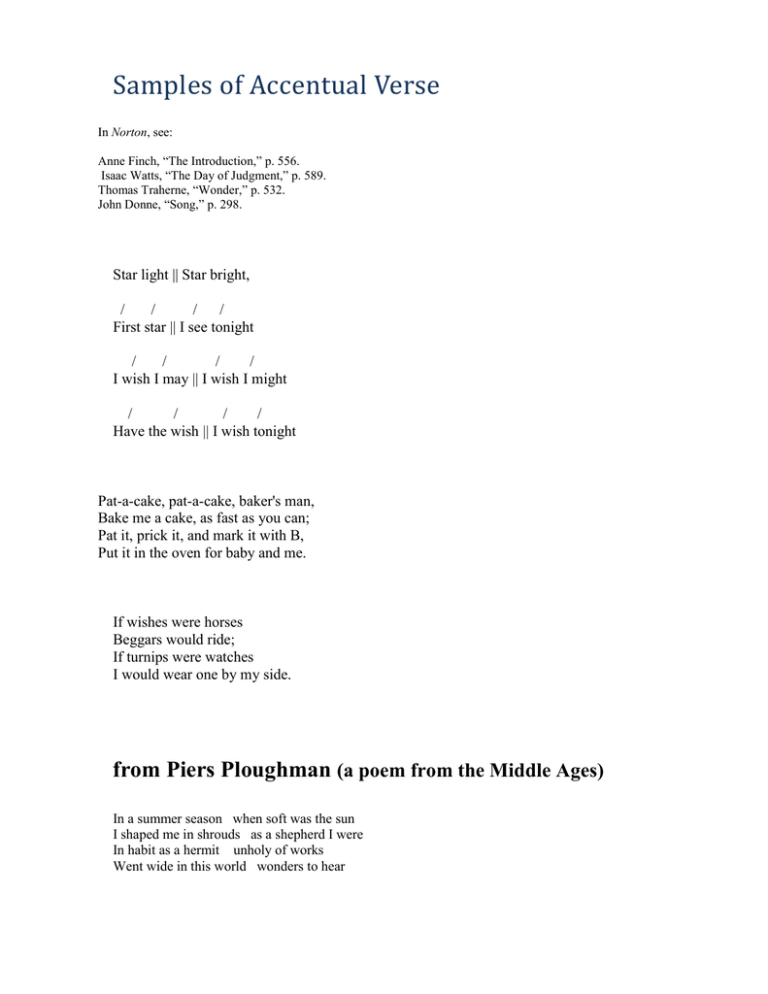
Samples of Accentual Verse In Norton, see: Anne Finch, “The Introduction,” p. 556. Isaac Watts, “The Day of Judgment,” p. 589. Thomas Traherne, “Wonder,” p. 532. John Donne, “Song,” p. 298. Star light || Star bright, . / . . . /. . . . . / . . ./ First star || I see tonight .. . / . . . /. . .. . . . / . . . ./ I wish I may || I wish I might . . / . . . . . /. . . . . . / .. .. ./ Have the wish || I wish tonight Pat-a-cake, pat-a-cake, baker's man, Bake me a cake, as fast as you can; Pat it, prick it, and mark it with B, Put it in the oven for baby and me. If wishes were horses Beggars would ride; If turnips were watches I would wear one by my side. from Piers Ploughman (a poem from the Middle Ages) In a summer season when soft was the sun I shaped me in shrouds as a shepherd I were In habit as a hermit unholy of works Went wide in this world wonders to hear And on a May morning, on Malvern hills, Strange fancies befell me, and fairy-like dreams. I was weary of wand'ring, and went to repose On a broad green bank, by a [broad] burn-side; As I lay there and leaned and looked on the waters, I slumbered and slept, they sounded so merry. Came moving before me a marvellous vision; I was lost in a […] waste; but where, I discerned not. I beheld in the east, on high, near the sun, A tower on a hill-top, with turrets well-wrought; A deep dale beneath, and a dungeon therein, With deep ditches and dark, and dreadful to see. A fair field, full of folk, I found there between, Of all manner of men, the mean and the rich, All working or wand'ring, as the [sad] world requires. Some ploughed with the plough; their play was but seldom; Some sowing, some earning, with sweat of their brows, The gain which the great ones in gluttony waste. In pride of apparel some passed on their way, And in costliest clothing were quaintly disguised. In prayer and in penance some placed their delight, And all for […] Lord's love lived strictly and hard, In hope to have after their heavenly meed… Crystabelle a poem from the late 18th cen . --Samual Taylor Coleridge (random segments) 'Tis the middle of night by the castle clock And the owls have awakened the crowing cock; Tu-whit!- Tu-whoo! The thin gray cloud is spread on high, It covers but not hides the sky. The moon is behind, and at the full; And yet she looks both small and dull. What makes her in the wood so late, A furlong from the castle gate? She stole along, she nothing spoke, The sighs she heaved were soft and low, And naught was green upon the oak, But moss and rarest mistletoe. The lady sprang up suddenly, The lovely lady, Christabel! 2 It moaned as near, as near can be, But what it is she cannot tell— The moon shines dim in the open air, And not a moonbeam enters here. But they without its light can see The chamber carved so curiously, Carved with figures strange and sweet, All made out of the carver's brain, For a lady's chamber meet: The lamp with twofold silver chain Is fastened to an angel's feet. The silver lamp burns dead and dim; But Christabel the lamp will trim. * Among the green herbs in the forest alone. Which when I saw and when I heard, I wondered what might ail the bird; For nothing near it could I see, Save the grass and herbs underneath the old tree. And in my dream methought I went To search out what might there be found; And what the sweet bird's trouble meant, That thus lay fluttering on the ground. I went and peered, and could descry No cause for her distressful cry; But yet for her dear lady's sake I stooped, methought, the dove to take, When lo! I saw a bright green snake Coiled around its wings and neck. Green as the herbs on which it couched, Close by the dove's its head it crouched; And with the dove it heaves and stirs, Swelling its neck as she swelled hers! I woke; it was the midnight hour, The clock was echoing in the tower; But though my slumber was gone by, This dream it would not pass awayIt seems to live upon my eye! And thence I vowed this self-same day With music strong and saintly song To wander through the forest bare, Lest aught unholy loiter there.' * 3 A little child, a limber elf, Singing, dancing to itself, A fairy thing with red round cheeks, That always finds, and never seeks, Makes such a vision to the sight As fills a father's eyes with light; And pleasures flow in so thick and fast Upon his heart, that he at last Must needs express his love's excess With words of unmeant bitterness. Perhaps 'tis pretty to force together Thoughts so all unlike each other; To mutter and mock a broken charm, To dally with wrong that does no harm. Perhaps 'tis tender too and pretty At each wild word to feel within A sweet recoil of love and pity. And what, if in a world of sin (O sorrow and shame should this be true!) Such giddiness of heart and brain Comes seldom save from rage and pain. __________________________________________________________________ Some Contemporary Pieces what if a much of a which of a wind --e.e.cummings what if a much of a which of a wind gives the truth to summer's lie; bloodies with dizzying leaves the sun and yanks immortal stars awry? Blow king to beggar and queen to seem (blow friend to fiend: blow space to time) —when skies are hanged and oceans drowned, the single secret will still be man what if a keen of a lean wind flays screaming hills with sleet and snow: 4 strangles valleys by ropes of thing and stifles forests in white ago? Blow hope to terror; blow seeing to blind (blow pity to envy and soul to mind) —whose hearts are mountains, roots are trees, it's they shall cry hello to the spring what if a dawn of a doom of a dream bites this universe in two, peels forever out of his grave and sprinkles nowhere with me and you? Blow soon to never and never to twice (blow life to isn't:blow death to was) —all nothing's only our hugest home; the most who die, the more we live Vampire's Nocturne from Nosferatu I am the image that darkens your glass, The shadow that falls wherever you pass. I am the dream you cannot forget, The face you remember without having met. I am the truth that must not be spoken, The midnight vow that cannot be broken. I am the bell that tolls out the hours. I am the fire that warms and devours. I am the hunger that you have denied, The ache of desire piercing your side. I am the sin you have never confessed, The forbidden hand caressing your breast. You've heard me inside you speak in your dreams, Sigh in the ocean, whisper in streams. I am the future you crave and you fear. You know what I bring. Now I am here. 5 --Dana Gioia Song of the Powers --David Mason Mine, said the stone, mine is the hour. I crush the scissors, such is my power. Stronger than wishes, my power, alone. Mine, said the paper, mine are the words that smother the stone with imagined birds, reams of them, flown from the mind of the shaper. Mine, said the scissors, mine all the knives gashing through paper's ethereal lives; nothing's so proper as tattering wishes. As stone crushes scissors, as paper snuffs stone and scissors cut paper, all end alone. So heap up your paper and scissor your wishes and uproot the stone from the top of the hill. They all end alone as you will, you will. 6 JUNK --Richard Wilbur (he’s imitating an Old English poem) An axe angles from my neighbor’s ashcan; It is hell’s handiwork, the wood not hickory, The flow of the grain not faithfully followed. The shivered shaft rises from a shellheap Of plastic playthings, paper plates, And the sheer shards of shattered tumblers That were not annealed for the time needful. At the same curbside, a cast-off cabinet Of wavily warped unseasoned wood Waits to be trundled in the trash-man’s truck. Haul them off! Hide them! The heart winces For junk and gimcrack, for jerrybuilt things And the men who make them for a little money, Bartering pride like the bought boxer Who pulls his punches, or the paid-off jockey Who in the home stretch holds in his horse. Yet the things themselves in thoughtless honor Have kept composure, like captives who would not Talk under torture. Tossed from a tailgate Where the dump displays its random dolmens, Its black barrows and blazing valleys, They shall waste in the weather toward what they were. The sun shall glory 7 in the glitter of glass-chips, Foreseeing the salvage of the prisoned sand, And the blistering paint peel off in patches, That the good grain be discovered again. Then burnt, bulldozed, they shall all be buried To the depth of diamonds, in the making dark Where halt Hephaestus keeps his hammer And Wayland’s work is worn away. 8
